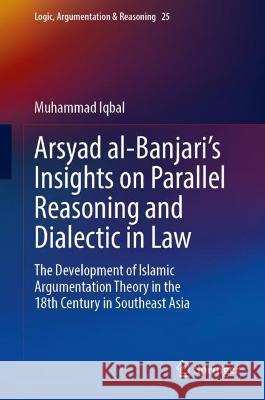Arsyad Al-Banjari's Insights on Parallel Reasoning and Dialectic in Law: The Development of Islamic Argumentation Theory in the 18th Century in Southe » książka
topmenu
Arsyad Al-Banjari's Insights on Parallel Reasoning and Dialectic in Law: The Development of Islamic Argumentation Theory in the 18th Century in Southe
ISBN-13: 9783030916756 / Angielski / Twarda / 2022
Arsyad Al-Banjari's Insights on Parallel Reasoning and Dialectic in Law: The Development of Islamic Argumentation Theory in the 18th Century in Southe
ISBN-13: 9783030916756 / Angielski / Twarda / 2022
cena 443,82 zł
(netto: 422,69 VAT: 5%)
Najniższa cena z 30 dni: 424,07 zł
(netto: 422,69 VAT: 5%)
Najniższa cena z 30 dni: 424,07 zł
Termin realizacji zamówienia:
ok. 22 dni roboczych
Bez gwarancji dostawy przed świętami
ok. 22 dni roboczych
Bez gwarancji dostawy przed świętami
Darmowa dostawa!
This book provides an epistemological study of the great Islamic scholar of Banjarese origin, Syeikh Muhammad Arsyad al-Banjari (1710-1812) who contributed to the development of Islam in Indonesia and, in general, Southeast Asia. The work focuses on Arsyad al-Banjari’s dialectical use and understanding of qiyās or correlational inference as a model of parallel reasoning or analogy in Islamic jurisprudence. This constituted the most prominent instrument he applied in his effort of integrating Islamic law into the Banjarese society.
This work studies how Arsyad al-Banjari integrates jadal theory or dialectic in Islamic jurisprudence, within his application of qiyās. The author develops a framework for qiyās which acts as the interface between jadal, dialogical logic, and Per Martin-Löf’s Constructive Type Theory (CTT). One of the epistemological results emerging from the present study is that the different forms of qiyās applied by Arsyad al-Banjari represent an innovative and sophisticated form of reasoning. The volume is divided into three parts that discuss the types of qiyās as well their dialectical and argumentative aspects, historical background and context of Banjar, and demonstrates how the theory of qiyās comes quite close to the contemporary model of parallel reasoning for sciences and mathematics developed by Paul Bartha (2010). This volume will be of interest to historians and philosophers in general, and logicians and historians of philosophy in particular.











